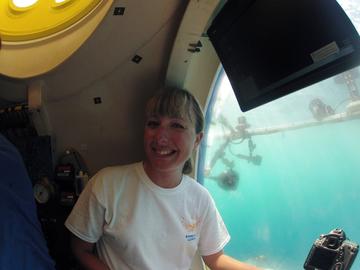Join us as we spend the week cruising around the Bay Islands of Honduras aboard the luxurious MV Caribbean Pearl II. We will begin our diving journey in Utila, then explore hidden sea mounts and search for whale sharks enroute to Roatan. After diving in Roatan we will head back to the home port on Utila. The week ends with a walk around the charming town of Utila.
$2,270, double occupancy in a Standard Cabana (other room options available, please inquire). Package includes 6 days of 3 dives per day, accommodation, 3 daily meals, use of resort kayaks, airport transfers. R/T ground/boat transfers from Belize City Airport (BZE).
+$300 REEF Program Fee per diver will be added to each package to cover the cost of the group leader, seminar and survey materials.
$1,210, double occupancy in a standard room. Package includes daily breakfast, five days of 2-tank dives, one night dive, unlimited shore diving 24/7, airport transfers, use of sea kayaks, service charges and government taxes (VAT charges are subject to change). Single Occupancy $1,460; Non-Diver $850; Oceanview Room Upgrade +$210pp double occ
+$300 REEF Program Fee per diver will be added to each package to cover the cost of the group leader, seminar and survey materials.
$908 CAD per diver double occupancy, $482 CAD for non-divers double occupancy. Includes: 7 boat dives plus unlimited shore dives, airfills, tanks and weights, 4 nights of accommodations, all meals during your stay (dinner Sunday night to breakfast on Thursday), and sales tax.
+$150 USD (US Dollars) REEF Program Fee per diver will be added to each package to cover the cost of the group leader, seminar and survey materials, and data management. This fee is payable directly to REEF through a secure payment portal on the REEF webpage.
$1,726 per person double occupancy ($2,146 single occupancy) - includes: lodging for 7 nights at the Kura Hulanda Lodge, breakfast each morning, 5 days of 2-tank boat dives, r/t airport transportation on Curacao, ground transportation for group activities, and all taxes.
+$200 REEF Program Fee per diver will be added to each package to cover the cost of the group leader, seminar and survey materials.
$1,009 per person double occupancy. $1,462 single occupancy, $517 pp non-diver double occupancy. Includes: 7 nights of lodging in a studio suite with kitchenette, 6 days of 2-tank AM boat dives, daily continental breakfast, all taxes. Nitrox additional charge (+$10/tank, reserved in advanced).
+$300 REEF Program Fee per diver will be added to each package to cover the cost of the group leader, seminar and survey materials.
$2,620 per person double occupancy. Includes: lodging for 7 nights onboard the Aqua Cat luxury liveaboard in an ocean view cabin, all meals and drinks, up to 5 dives per day for 6 days and 2 dives on the last day of diving, and r/t ground transportation from Nassau Airport.
+$200 REEF Program Fee per diver will be added to each package to cover the cost of the group leader, seminar and survey materials.
A database of fish surveys conducted by volunteer recreational divers trained by REEF was used to examine fish populations in Monterey Peninsula, California, between 1997 and 2011. Over 3,000 surveys were conducted as part of this ongoing citizen science effort. The analysis was conducted using a numerical conversion method to calculate population estimates from REEF log-scale data (this method was described in a companion paper published in the same CalCOFI Reports issue).
This paper describes several models to convert order-of-magnitude count data that are collected during REEF Roving Diver Technique (RDT) surveys to a numeric mean, and demonstrate that with a sufficient number of surveys, estimates of the mean with a reasonably small confidence interval can be attained. For each model, parameter estimates and associated confidence intervals were derived from 292 RDT surveys where precise counts were also made. Models were compared using the small sample Akaike Information Criteria (AICc).
REEF's Director of Special Projects, Lad Akins, and REEF affiliate scientist Dr. Stephanie Green (Oregon State University) and REEF Advisory Panel member Dr. Steve Gittings (NOAA National Marine Sanctuaries) participated in the first submersible expedition to assess the lionfish invasion on deep marine habitats off South Florida June 27-29. While REEF and other scientists have studied lionfish in shallow habitats, the Antipodes lionfish expedition gave scientists the opportunity to learn about lionfish populations far below recreational diving limits.

